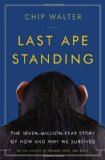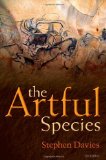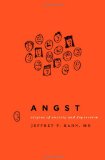January 30, 2013

Last Ape Standing: The Seven-Million-Year Story of How and Why We Survived by Chip Walter (Walker & Co., 2013)
(kindle ed.), (amazon.co.uk)
Book description from the publisher:
Over the past 180 years scientists have sifted through evidence that at least twenty-seven human species have evolved on planet Earth. And as you may have noticed, twenty-six of them are no longer with us, done in by their environment, predators, disease, or the unfortunate shortcomings of their DNA. What enabled us to survive when so many other human species were shown the evolutionary door? Last Ape Standing: The Seven-Million-Year Story of How and Why We Survived by acclaimed science journalist Chip Walter tells the intriguing tale of how against all odds and despite nature’s brutal and capricious ways we stand here today, the only surviving humans, and the planet’s most dominant species.Drawing on a wide variety of scientific disciplines, Walter reveals how a rare evolutionary phenomenon led to the uniquely long childhoods that make us so resourceful and emotionally complex. He looks at why we developed a new kind of mind and how our highly social nature has shaped our moral (and immoral) behavior. And in exploring the traits that enabled our success, he plumbs the roots of our creativity and investigates why we became self-aware in ways that no other animal is. Along the way, Last Ape Standing profiles other human species who evolved with us and who have also shaped our kind in startling ways – the Neanderthals of Europe, the “Hobbits” of Indonesia, the Denisovans of Siberia, and the recently discovered Red Deer Cave people of China, who died off just as we stood at the brink of civilizations eleven thousand years ago.Last Ape Standing is an engaging and accessible story that explores the forces that molded us into the peculiar and astonishing creature that we are.
See also: Author’s website All Things Human
Comments (0)
- human evolution,new books
January 5, 2013

The Artful Species: Aesthetics, Art, and Evolution by Stephen Davies (Oxford University Press, USA, 2013)
(amazon.co.uk)
Book description from the publisher:
The Artful Species explores the idea that our aesthetic responses and art behaviors are connected to our evolved human nature. Our humanoid forerunners displayed aesthetic sensibilities hundreds of thousands of years ago and the art standing of prehistoric cave paintings is virtually uncontested.
In Part One, Stephen Davies analyses the key concepts of the aesthetic, art, and evolution, and explores how they might be related. He considers a range of issues, including whether animals have aesthetic tastes and whether art is not only universal but cross-culturally comprehensible.
Part Two examines the many aesthetic interests humans take in animals and how these reflect our biological interests, and the idea that our environmental and landscape preferences are rooted in the experiences of our distant ancestors. In considering the controversial subject of human beauty, evolutionary psychologists have traditionally focused on female physical attractiveness in the context of mate selection, but Davies presents a broader view which decouples human beauty from mate choice and explains why it goes more with social performance and self-presentation.
Part Three asks if the arts, together or singly, are biological adaptations, incidental byproducts of nonart adaptations, or so removed from biology that they rate as purely cultural technologies. Davies does not conclusively support any one of the many positions considered here, but argues that there are grounds, nevertheless, for seeing art as part of human nature. Art serves as a powerful and complex signal of human fitness, and so cannot be incidental to biology. Indeed, aesthetic responses and art behaviors are the touchstones of our humanity.
See also: Author at PhilPapers
Comments (0)
- culture,human evolution,new books
November 28, 2012

Why Humans Like to Cry: The Evolutionary Origins of Tragedy by Michael Trimble (Oxford University Press, USA, 2012)
(kindle ed.), (amazon.co.uk)
Book description from the publisher:
Human beings are the only species who cry for emotional reasons. We weep at tragedies both in our own lives and in the lives of others–remarkably, we even cry over fictional characters in film, opera, novels, and theatre. But why is weeping unique to humanity? What is different about the structure of our brains that sets us apart from all other animals? When on our evolutionary journey did we first recognize the tragedy of life? When did our early ancestors first cry?
In this fascinating volume, neurologist Michael Trimble offers a wide-ranging discussion of emotional crying, looking at its physiology as well as its evolutionary past. To shed light on why crying is uniquely human, Trimble offers an insightful account of the neuroanatomy of the human brain, highlighting differences from those of other primates, especially with regards to the representation of emotion and the circuitry related to the release of tears. He also looks at the epidemiology of crying (who cries, where, and when) and he discusses why people often feel good after crying and why we have developed art forms–most powerfully, music–that move us to tears. Throughout, Trimble weaves a discussion of Nietzsche’s Birth of Tragedy, exploring the origin of Tragedy as an art form, and using the images of Apollo and Dionysus as representative of biological and cognitive forces which are integral to the behavior and thinking of mankind. Finally, Trimble reveals that our emotional responses to tragedy–and crying for emotional reasons–have evolved over several millions of years.
The insights found here shed much light on an enigmatic part of our humanity. The book offers a profound glimpse into the human heart as well as deep insight into the role of art in our emotional lives.
Comments (0)
- culture,human evolution,new books,psychology
October 2, 2012

Angst: Origins of Anxiety and Depression by Jeffrey P. Kahn (Oxford University Press, USA, 2012)
(amazon.co.uk)
Book description from the publisher:
Some twenty percent of us are afflicted with common anxiety and depressive disorders–not just brief bouts of nervousness or sorrow, but painful dysfunctions without obvious benefit. Why do so many people suffer from angst?
In this path-breaking volume, engagingly written for the general public, psychiatrist Jeffrey Kahn reveals that angst ultimately results from our transformation, over tens of thousands of years, from biologically shaped, almost herd-like prehistoric tribes, to rational and independent individuals in modern civilization. Kahn looks at five basic types of modern-day angst–Panic Anxiety, Social Anxiety, OCD, Atypical Depression, and Melancholic Depression–and shows how each derives from primeval social instincts that once helped our ancestors survive. For instance, the “panic disorder” which prevents some people from flying may have originally evolved to keep our tribal ancestors from traveling dangerously far from home. Likewise, the increased emotional sensitivity to social rejection that now triggers episodes of “atypical depression” may have helped maintain polite behavior and social harmony in our ancestors. Our distinctly human civilization and rational consciousness lets us defy these social instincts. But those over-ridden instincts can resurface as stressful emotional disorders. Kahn notes that some of us painfully tackle this distress head-on, in ways that can advance intellectual creativity, social performance and productivity. He also describes the interplay of instinct with the advance of civilization, and on how evolutionary perspective explains why modern treatments work.
Ranging from Darwin and Freud to the most cutting-edge medical and scientific findings–drawing from ancient writings, modern humor and popular lyrics, and with many amusing cartoons–Angst offers us an exciting new slant on some of the most pervasive mental health issues of our time.
Comments (0)
- human evolution,new books,psychology






